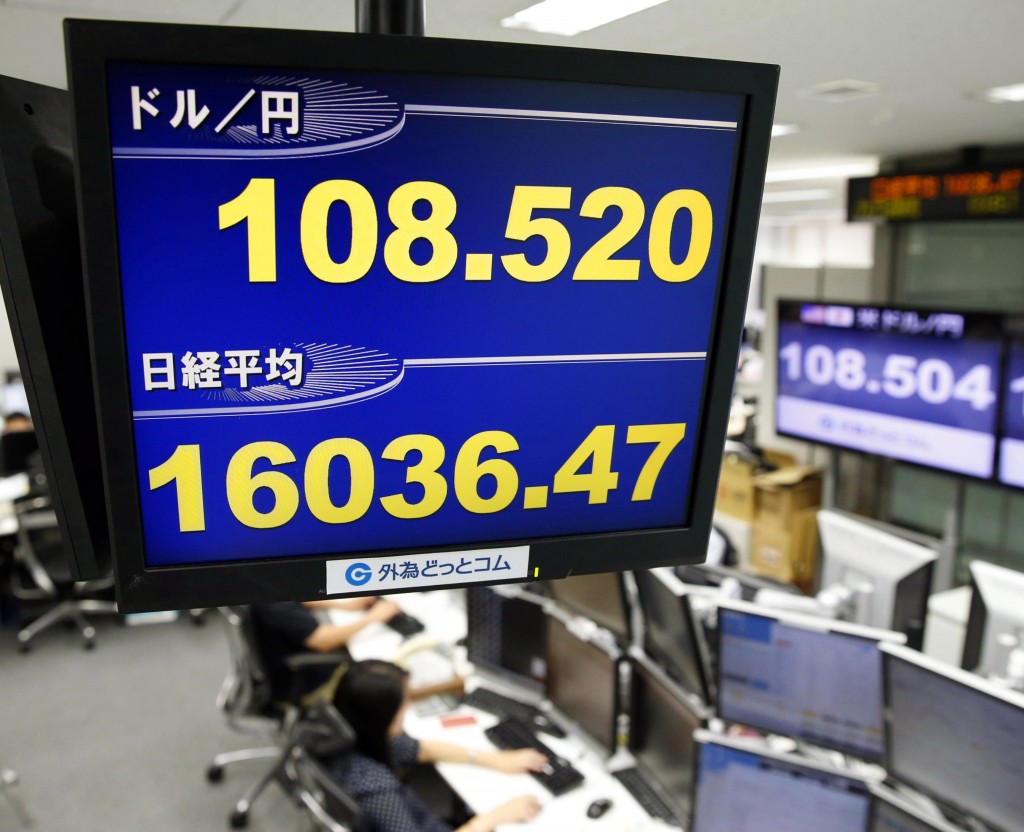- California Assembly OKs highest minimum wage in nation
- S. Korea unveils first graphic cigarette warnings
- US joins with South Korea, Japan in bid to deter North Korea
- LPGA golfer Chun In-gee finally back in action
- S. Korea won’t be top seed in final World Cup qualification round
- US men’s soccer misses 2nd straight Olympics
- US back on track in qualifying with 4-0 win over Guatemala
- High-intensity workout injuries spawn cottage industry
- CDC expands range of Zika mosquitoes into parts of Northeast
- Who knew? ‘The Walking Dead’ is helping families connect
South Korea monitors falling yen, tells exporters to take insurance

Japan Financial Markets
Money traders of a foreign exchange dealing company work under an electric screen indicating the U.S. dollar against the Japanese yen in Tokyo Thursday, Sept. 18, 2014. The U.S. dollar hit its highest level against yen in six years. (AP Photo/Kyodo News)
SEOUL (Yonhap) — South Korea is closely monitoring the won-yen exchange rate that financial authorities say has reached a worrisome range and is encouraging exporters to take some hedging measures, officials said Sunday.
“The low-yen trend has entered its third year, but it is showing signs of accelerating recently,” an official staying close to exchange issues said. “Any lopsidedness in exchange rates can negatively impact the local economy. We are watching the situation very closely.”
The Korean won traded at 958.43 per 100 Japanese yen as of 5:50 p.m. Friday compared to 971.68 on Sept. 1. It rose from 1,017.48 won reached on Aug. 8.
Both the finance minister and the central bank chief have repeated their concerns about the weakening yen, which can seriously strike South Korean exporters where it hurts. Manufacturers of the two countries compete one-on-one in many foreign markets, and the exchange rate can affect the products’ prices.
Bank of Korea Governor Lee Ju-yeol, speaking to lawmakers on Sept. 16, said while the softening yen has not yet created deep difficulties for Korean firms, it has boosted the profit of Japanese companies.
“If they leverage their improved profitability, the situation may change,” Lee said.
“The yen is likely to weaken while the dollar likely will strengthen. Things will become more complicated. We plan to address the issues appropriately.”
Finance Minister Choi Kyung-hwan raised similar concerns when talking to South Korean reporters during the Group of 20 meetings in Australia.
Market watchers say the biggest worry is that the government may not have the effective tools to stave off the impact of the falling yen.
“The won-yen exchange rate is an arbitrate rate. There isn’t much that we can do,” Choi said in Australia.
The won-yen rate is tracked through the won-dollar and yen-dollar rates instead of direct trading.
The Korea Economic Research Institute said last week that the local currency could hike to the 800 won range next year, further stoking concerns.
On Sunday, a report from local brokerage Tongyang Securities said the real effective exchange rate (REER) for the Japanese currency is at its lowest in over 30 years.
Using 2010 as the base year with 100 as a benchmark, the brokerage said that REER has fallen to 73 so far this month compared to 78.89 in August. This is the lowest since 1982, according to its report.
“If the yen falls at a more rapid pace than other currencies, we are going to see a new age of low yen entirely different from 30 years ago in terms of REER,” Lee Chul-hee, an analyst at Tongyang, said.
Market watchers say South Korea could intervene to lower the won against the greenback as an indirect way of cushioning against the falling yen, but that could invite protest from the U.S. and other countries.
Lowering the key rate is another option, but as the won is not a widely traded international currency, such a measure does not guarantee results, they say.
“The government cannot directly step in. The companies, if they want to prevent problems, have to subscribe to exchange risk insurance,” a government official said, speaking on condition of anonymity. “But there is this ungrounded expectation among local firms that the won won’t rise any further, and we are worried that this will enlarge the potential damage.”
The government is promoting insurance for smaller firms, who stand to suffer more seriously from exchange rate volatilities, holding briefing sessions in the coming months.












![일본 사도광산 [서경덕 교수 제공. 재판매 및 DB 금지]](http://www.koreatimesus.com/wp-content/uploads/2024/07/PYH2024072610800050400_P4-copy-120x134.jpg)


